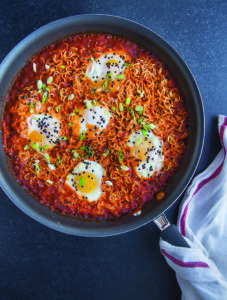Good Shabbos, Shabbat Shalom! If you’re one of the many thousands of followers of Chanie Apfelbaum’s popular food blog, Busy in Brooklyn, you’re familiar with her ultra-creative, super-fun, delicious recipes, such as her Torah Cannoli, which make a fun treat for Shavuot.
Apfelbaum had dreamed of being a cookbook author for a long time, but as a busy mother of five children, she just didn’t how to make it work. She was always waiting for the right time, but life kept getting in the way. Last year, Apfelbaum finally decided that if she wanted her dream to come true, she just had to bite the bullet and go for it. Her dream has come true at last with her newly published cookbook, Millennial Kosher: Recipes Reinvented for the Modern Palate.
The millennial kosher kitchen is one in which food is reinvented and re-imagined in new, exciting ways. It includes ingredients that are healthier, fresher and more vibrant than ever before. Yesterday’s margarine is today’s coconut oil, bone broth is the new chicken soup and onion soup mix is replaced with umami-rich porcini mushroom powder.
Millennial Kosher is not just for millennials – it’s for anyone who appreciates creative cuisine. Today, kosher food is spicier and bolder than what many of us grew up eating. There’s an emphasis on fresh and seasonal ingredients, less processed foods and healthier, non-dairy alternatives. Modern kosher food reinterprets and reinvents tradition, yet still stays true to our heritage. It’s food that’s influenced by cultural cuisine and is not limited to, but is inspired by, kosher guidelines.
Apfelbaum explains that, “When I thought about the dishes I wanted to include in the book, I realized that I had to appeal to a wide spectrum – people who love my healthy recipes, people all over the world who make my not-so-healthy hasselback salami, those who want Yom Tov recipes, people who want quick and easy dinners and those who want recipes that are more complex. Of course, I also needed to appeal to those who want to introduce fresh and new ingredients into their dishes, and also those who prefer to use basic pantry staples.”
Millennial Kosher provides home cooks with over 150 innovative recipes for everyday and holiday meals, plus beautiful colour photos for every dish. Recipes run the gamut from breakfast and brunch, appetizers, soups, salads and spreads, to fish, poultry, meat, dairy and desserts
For the photo shoots, Apfelbaum transformed her dining room into a photography studio and hired an assistant to help cook the recipes, preparing five to eight recipes per day. Apfelbaum styled and photographed each dish amid pick-ups, snowstorms and diaper changes. Her five children were thrilled to have endless options for dinner each night, her cleaners got a generous goody bag at the end of the week and the family ate their Shabbat meals in the middle of their tiny kitchen until they finished shooting the photos .
Apfelbaum believes that “putting your own spin on classic dishes puts the fun back into things, and you’ll look at food as more than just a means to satiate others, but as an expression of yourself and your creative spirit.”
For Shavuot, Mother’s Day (or any day), try one of these scrumptious recipes from Millennial Kosher:

Ramen Shakshuka (Pareve)
Yields 3 servings
Chanie writes: “Ah, shakshuka, you are my all-time favourite breakfast. I love changing you up with different ingredients, and serving you for brunch, placing the pan right in the middle of the table, family style. I’ve created so many variations of shakshuka on my blog over the years – from garbanzo bean shakshuka to spaghetti squash shakshuka, eggplant shakshuka and even Mexican quinoa shakshuka. This ramen-based recipe is a super-simplified version, so you can make it with very few ingredients on hand.”
- 2 cups marinara sauce
- 1 tsp sriracha
- 375 ml (1½ cups) water
- 2 (75 g) packages ramen noodles, flavouring packets discarded
- 6 eggs
- 2 scallions, sliced
- 5 ml (1 tsp) toasted sesame seeds
In a skillet, bring marinara sauce, sriracha and water to a simmer. Add ramen noodles; cook until noodles start to soften, about 2 minutes. Flip noodles; continue to cook until the block of ramen loosens, another 2 minutes. (Don’t worry if they are not cooked through; they will continue to cook along with the eggs.)
With a spoon, make a well in the sauce. Crack an egg into a small bowl; gently slide it into the well. Repeat, one by one, making wells and sliding in remaining eggs. Cover the skillet; cook until egg whites are set, 4-5 minutes. Garnish with scallions and sesame seeds. Serve immediately.

Summer Berry & Feta Salad With Basil Lime Dressing (Dairy)
Yields 4 servings
This is your new must-have summer salad. Forget saving it for Shavuot or dairy Shabbat meals – you’re going to want to make salad for lunch, just so you can eat this. Trust me.
- 125 g (5 oz) frisée or arugula
- 250 ml (1 cup) sliced strawberries
- 125 ml (1/2 cup) blueberries
- 75 ml (1/3 cup) candied pecans
- 1/2 small red onion, thinly sliced
- 250 ml (1 cup) crumbled feta cheese
- Basil Lime Dressing
- 75 ml (1/3 cup) light olive oil
- 45 ml (3 tbsp) lime juice
- 30 ml (2 tbsp) honey
- 125 ml (1/2 cup) packed fresh basil leaves
- Salt, to taste
- Pepper, to taste
Prepare the dressing: Place oil, lime juice, honey, basil, salt and pepper into a blender or food processor; blend until smooth and creamy.
Spread the frisée on a platter; top with strawberries, blueberries, pecans, red onion and feta. Drizzle with dressing before serving.
Recipes reprinted with permission from Millennial Kosher by Chanie Apfelbaum. (Artscroll/Shaar). Norene Gilletz is the leading author of kosher cookbooks in Canada. Norene lives in Toronto and her motto is, “Food that’s good for you should taste good!” For more information, visit her website.
